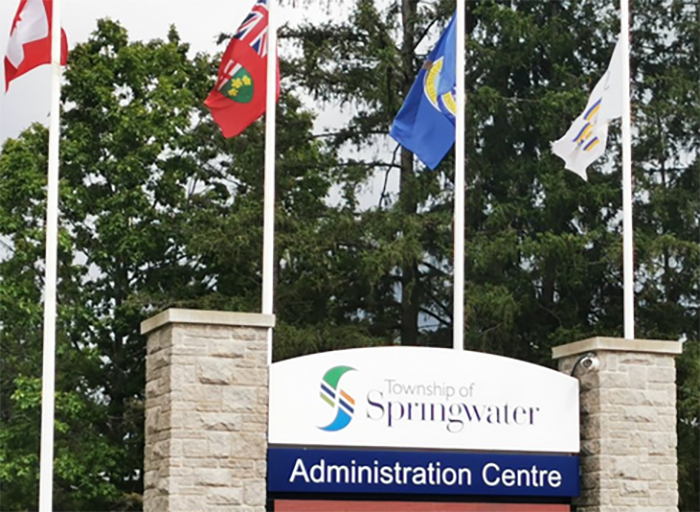Annexation talks trigger mayor-councillor clash in Springwater
By: Wayne Doyle, Local Journalism Initiative Reporter, Source: BarrieToday.com, Jun 19, 2025
SPRINGWATER — Springwater Township council meetings seem to be coming precariously close to being The Jerry Springer Show of municipal politics, with council members appearing to relish the opportunity to hurl vindictive, accusatory comments at will.
At its last meeting, two weeks ago, the township’s clerk was accused of conspiring with the mayor to withhold information from the township’s official meeting agenda.
Two meetings ago, on May 21, Springwater Mayor Jennifer Coughlin and Barrie Mayor Alex Nuttall seemed unprepared for the swarming they had received from township councillors following Nuttall’s presentation of an early draft proposal of an agreement that would resolve Barrie’s boundary expansion plans into Springwater.
The latest tete-a-tete was triggered by an eight-sentence report from the township’s agricultural advisory board on its view of annexation of Springwater land by the City of Barrie, or rather, council’s representative on the board, which is Coun. Phil Fisher.
When the agricultural advisory board’s report was presented to Springwater council for information, Fisher was the first to speak to it, since he sits on the board.
He shared the committee’s objection to annexation, delivering its final decision as it was written in the report.
“The agricultural advisory committee submits to council that the committee is firmly opposed to the annexation of agricultural lands to the City of Barrie,” he said, quoting from the report.
All would have been fine in the township had he stopped there.
But he didn’t.

“It says here that the committee met with Mayor Coughlin to discuss the Barrie boundary proposal and if that’s exactly what happened from the onset, I would have been happy,” he said, setting up the knock-out blow. “But I was displeased.
“I was displeased, frankly, with you Mayor Coughlin. You led the conversation by asking the committee, landowners and farmers in this municipality, what they thought their taxation should be should this annexation happen,” Fisher said.
He said he found the question leading and accused Coughlin of sidestepping the real issue — if the committee thought the boundary proposal should go through.
Fisher said he stewed over it for a week.
“It’s been over a week since then and typically I cool down from a situation like that, but I think you acted with a level of contempt for the farmers and the agricultural…,” he began to say before being cut off by Coughlin on a point of order.
“I will ask you to afford me the same level of respect that you offer to our staff and this chamber and the positions that we hold,” she said sternly to Fisher.
“To suggest that I have a level of contempt for our agricultural committee is out of order,” she added.
Unfazed and unapologetic, Fisher held his line.
“I said that I believed you acted with a level of contempt,” he began.
“Again, Coun. Fisher, I’m going to ask you to uphold the code of conduct,” Coughlin said.
Fisher ignored her charge again.
“I don’t think I did anything wrong,” he countered. “I believe you acted in that manner. I’ll continue.”
Fisher then accused her of sidestepping the question in order to hoodwink them.
“I believe you sidestepped the question in order to get them to go along with this and allow them to seemingly, seemingly, allow you to negotiate on their behalf when they were not giving you that right,” he said.
“I don’t believe you acted well in that meeting. I believe it was misleading,” Fisher added.
Offended by the comment, Coughlin explained how she came to be a part of the committee meeting.
She said she went through the township’s clerk to the committee’s chair to seek permission to have the Barrie’s boundary expansion discussion added to the committee’s agenda.
Coughlin said she knew the committee was opposed to Barrie’s boundary expansion plans, but she needed their input in case it did happen.
“Should it happen, how do I best negotiate, how do we as a council ensure that there’s an opportunity to put in writing, in the principles of the agreement and eventually, the contract, that there’s something in there that ensures generational farmers can continue to farm?” she said. “How can we help do that?”
The mayor said she asked the committee members to bring examples they’ve found through previous boundary adjustments, amalgamations or annexations across Ontario of what they would consider best practices so they can be incorporated into any agreement that may be made in the future with the City of Barrie.
“That was the intent,” she said. “There was no contempt and to suggest I had contempt or that I was being misleading, I was not.
“You suggesting that at this table will not be tolerated,” Coughlin added.
“Mayor Coughlin, you can be offended by what I said if you like. I know what I saw and I don’t mind reporting it back to council.” Fisher countered. “You can paint yourself as being benevolent being there, but I know what I saw and I’m glad I was there to draw attention to it.”
“It’s not benevolence,” she snapped. “It’s actually my job and you are assigned to the committee, so both us were there doing our job.”
Council voted in favour of receiving the report for information.


